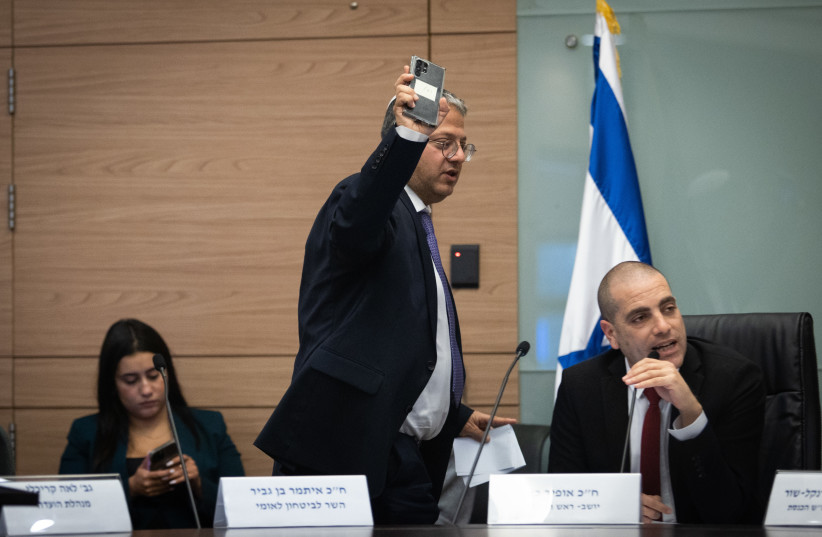Ben-Gvir's controversial 'Police Law' legislation resumes in Knesset

The committee debates that began on Sunday resumed where they left off – preparing the bill for its second and third readings in the Knesset plenum, after which it will pass into law.
A special Knesset committee led by Likud MK Ofir Katz on Sunday began to debate the second part of National Security Minister Itamar Ben-Gvir’s “Police Law,” which would broaden his power over the Israel Police.
The first part of the controversial law passed in the Knesset on December 27, two days before the current government was sworn in. The law was the last to pass out of a package of four bills that Prime Minister Benjamin Netanyahu’s coalition partners demanded as preconditions for entering the government.
Debates over the law in the weeks preceding its passage highlighted a number of aspects that posed legal difficulties. Ben-Gvir agreed to a compromise in which the Knesset would pass those parts of the law that were considered legal and resume debate on the rest of the provisions later.
According to Knesset protocol, a law that splits into two does not have to begin its legislative process from the beginning. Therefore, the committee debates that began on Sunday resumed where they left off – preparing the bill for its second and third readings in the Knesset plenum, after which it will pass into law.
'Police Law': What are Ben-Gvir's planned changes?
The part that passed on December 27 anchored the Israel Police's subordination to the government, as well as the national security minister's ability to set policy and general principles; enabled the minister to set policy regarding investigations, after consulting with the Attorney-General, the police commissioner and the officers responsible for investigations; and required that the minister reports to the Knesset Public Security Committee once a year, as well as publish any policy decisions on the police's website.
The part that passed on December 27 anchored the Israel Police’s subordination to the government, as well as the national security minister’s ability to set policy and general principles. It enabled the minister to set policy regarding investigations after consulting with the attorney-general, the police inspector-general and the officers responsible for investigations. It required that the minister report to the Knesset Public Security Committee once a year and publish any policy decisions on the Israel Police website.
The new part of the law adds a provision that the police inspector-general is “subordinate to the minister”; that the inspector-general is the police’s supreme commanding officer; and that the minister has the authority to “set policy regarding the duration of treatment of cases” after consulting with the attorney-general, the police inspector-general and the officers responsible for investigations.
Ben-Gvir kicked off the debate by saying the law was essential for him to carry out his policies. Opposition MKs Gilad Kariv (Labor) and Naor Shiri (Yesh Atid) asked Ben-Gvir why the first part of the law was not enough for him to do so.
Kariv and Shiri, as well as representatives from the Israel Democracy Institute, the Israel Religious Action Center (IRAC), the Zulat Institute for Equality and Human Rights and former Meretz MK Gaby Lasky, argued that the clause that make the inspector-general personally subordinate to the minister would give the minister de facto control over operative decisions. Some of them also pointed out that the term “treatment of cases” was unclear and warned that it could give the minister the power to influence cases against public figures, including those he was allied with.
A police representative said laws already existed that placed limits on the duration of cases based on their severity, interest to the public, age and health of the defendant and other considerations. The proposal to give the minister power to influence the duration of cases might contradict this, and its necessity was unclear, the representative said.
Jerusalem Post Store
`; document.getElementById("linkPremium").innerHTML = cont; var divWithLink = document.getElementById("premium-link"); if (divWithLink !== null && divWithLink !== 'undefined') { divWithLink.style.border = "solid 1px #cb0f3e"; divWithLink.style.textAlign = "center"; divWithLink.style.marginBottom = "15px"; divWithLink.style.marginTop = "15px"; divWithLink.style.width = "100%"; divWithLink.style.backgroundColor = "#122952"; divWithLink.style.color = "#ffffff"; divWithLink.style.lineHeight = "1.5"; } } (function (v, i) { });

